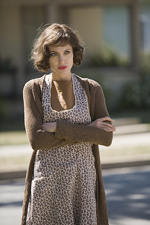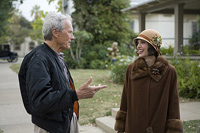Christine Collins (Angelina Jolie) is a single mother—competent, responsible, and devoted to her nine-year-old son Walter—who works as a switchboard supervisor in Los Angeles. She returns home from a weekend shift in early 1928 to discover that Walter has vanished. A nationwide search is launched, but to no avail, until a child claiming to be Walter Collins surfaces in Illinois six months later. He is returned to Christine, who immediately recognizes that the boy is not her son. Broken-hearted, confused, and manipulated by a shifty police force unwilling to recognize its mistake in front of the press, she allows herself to be persuaded to take the boy home on a “trial basis.”
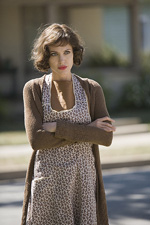
Becoming increasingly certain that the police have simply made a mistake, Christine protests and persists in requesting that they re-open her case and continue to search for Walter. But the Los Angeles Police Department of the time—embattled, inept, rotting from the inside out—recognizes that she represents a potential public relations nightmare for them, and goes to great lengths to paint Christine as a bad, irresponsible, and mentally disturbed woman. She fights back with the help of Reverend Gustav Briegleb (John Malkovich), who has made it his mission to expose what he calls from the pulpit “the most violent, corrupt, and incompetent police department this side of the Rockies.” But in this society, women who stand up against corrupt authority were not smiled upon, and things get much worse for Christine before they get better.
Meanwhile, a detective on a simple deportation case stumbles across a teenager who tells a sickening tale with potentially explosive implications, and as the case unfolds, the city is rocked to its core. As the cases dovetail, the justice system is forced to confront its problems, inequities, and injustices—but in ways nobody is expecting.
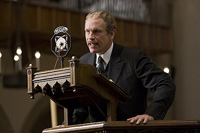
Based closely on a true story, there’s a lot in Changeling to remind us that the “good old days” weren’t necessarily so good. Even (and especially) by today’s standards, the crimes committed in Wineville are heinous and disturbing, but that seems almost mild compared to the treatment of innocent citizens, and especially women, by the LAPD at the time. Amy Ryan, in a short but brilliant turn as a “lady of the night” who crossed a police officer, tells Christine that “everyone knows women are fragile; if we’re insane, nobody has to listen to us.” Halfway through the film, I scribbled down that I was reminded why the feminist movement was necessary—one can hardly imagine a police department today operating with immunity under such unbridled and unchecked misogyny, or a woman who would not be willing to put up a fight. (Of course, today, such a police force would be accountable to a simple DNA test.)
This is the kind of movie that automatically garners Oscar buzz: an emotional, dramatic period piece, with a celebrated director and strong performances. Christine has little of the sexpot we’re used to from Jolie, and so her performance is especially haunting as a strong, independent woman who nevertheless is a product of her time. Malkovich, as a feisty minister who is completely in touch with the problems in his wider community, is a refreshing and inspiring kind of preacher to see on the big screen. Director Clint Eastwood was born in 1930 and grew up around southern California, making him one of the few working directors today who can actually remember the older LA depicted in the film. It’s to good effect; this Los Angeles feels spot-on, down to the cable cars.
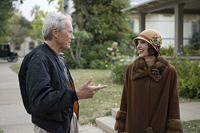
So the real question with this sort of movie is whether it will deserve the Oscar nominations it seems likely to get. And with Changeling, I’m not convinced. Its “true story” roots may be its problem. Screenwriter J. Michael Straczynski says that he stuck closely to the facts of the case in order to honor Christine’s bravery, and that’s admirable. In fact, it’s amazing that this bit of history hasn’t been previously adapted into a film, given its cinematic potential.
Unfortunately, it also means that the story, which is riveting for most of its first two hours, loses steam by the end and finishes about half an hour later than necessary in an attempt to tell the whole tale. There is no satisfactorily corresponding payoff for the audience. A screenplay based on an original tale can conclude in a more natural place, and though real life rarely follows the best dramatic arc, “true story” movies sometimes lose track of telling a good story in their overarching need to cover it all. When a movie with this much potential squanders some of its impact with a wandering ending, it’s hard for the audience to ignore the deficiency.
But whatever its flaws, Changeling is worth seeing. Aside from the chilling implications (who will protect us from corrupt protectors?), it is not a judgmental or political film. It’s even-handed in its treatment of all its characters, and there’s a spark of humanity in all of the bad guys. The end result conveys a broken-heartedness over the deficiencies and evil perpetuated by humans, the inescapable flaws in the justice system of a fallen world, and the lengths that people will go to protect their reputation.
Talk About It
Discussion starters- Changeling emphasizes a society’s poor treatment of women, both those who are moral and those who sin. What has changed since then in our world? What would Jesus have to say to a woman like Carol Dexter (Amy Ryan)?
- It’s clear that most people in this film know what is the right thing to do, but some choose not to act. What does James 4:17 say about people like Detective Jones, who know what is right, and yet choose to ignore it?
- What do you make of Gordon Northcott’s claim of repentance?
The Family Corner
For parents to considerChangeling is rated R for some violent and disturbing images, and language. Slight spoilers: It’s an inherently disturbing plot, with several scenes of bloody violence toward children, a hanging, and badly mistreated women in an asylum (both sane and not). The bad language, which includes a few f-bombs, is used in expected situations, and is not gratuitous.
Photos © Copyright Universal Pictures
Copyright © 2008 Christianity Today. Click for reprint information.

